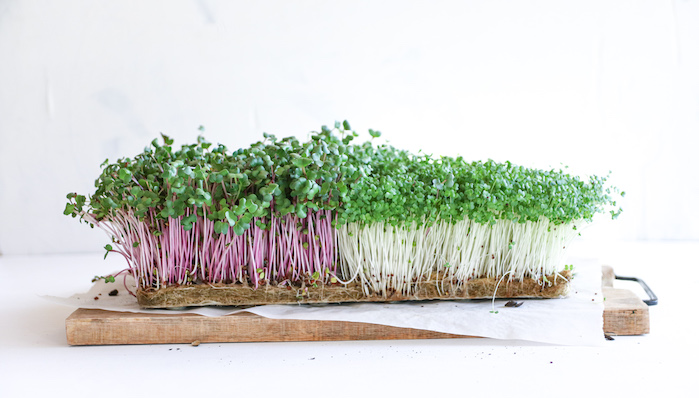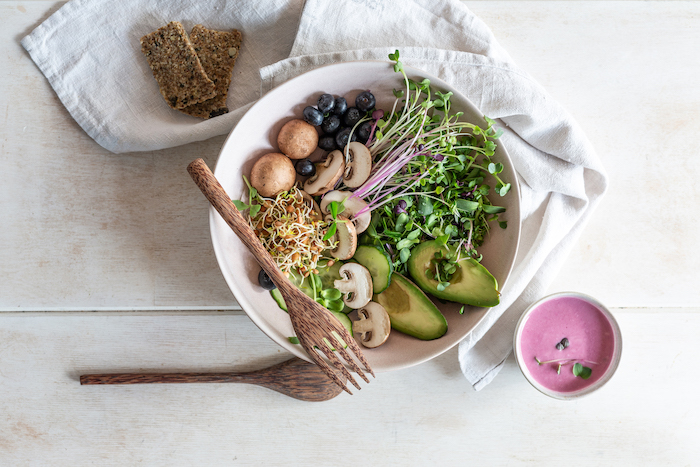Let’s talk about what “raw food” actually means. When you hear the term “raw food,” it probably brings to mind a cold, crunchy carrot at best. And yet there’s a new, healthy lifestyle movement currently developing around this very concept. Raw food is the new healthy food scene – and it’s easy to understand if you take a closer look.
When we speak of “raw food” we’re specifically talking about food that’s not cooked at a temperature higher than 42° Celsius (107° Fahrenheit). This way, all of the enzymes, vitamins, mineral materials, and secondary phytonutrients are able to stay intact – in other words, the food remains alive!
Actually, we all eat raw food to a certain extent. Just about everybody eats apples, carrots, or a side salad on a fairly regular basis.
But what’s exciting is when that salad becomes the main course. All of the delicious dishes that can be made from fruit, vegetables, nuts, and seeds can be so revolutionary, that after a certain point, there’s simply no room left in the kitchen (or even in the stomach) for bread, milk, cheese, meat, or refined sugar.
With great confidence, we at Your Nutrition prefer to eat food that has not been made in a factory, as is so often the case today with the pastas, dumplings, cookies, or pizzas that you can buy from the supermarket. And imagine the difference in energy that you receive from eating fresh fruit as opposed to eating a dead animal. “Dead” food tends to make us feel dull, sluggish, low in vibration, low energy, and bloated.
To name just a few benefits of this kind of diet, fresh plant foods:
- contain vitamins and minerals in a natural complex network of active ingredients
- are rich in enzymes
- strengthen the immune system
- are rich in fiber
- promote healthy digestion
- cleanse the body
- alkalize the body
- contain all kinds of phytonutrients
- create antioxidant, anti-inflammatory, and anti-carcinogenic effects
- contain a high amount of chlorophyll
- help us maintain a slim physique
- are a natural mood-booster
- provide more energy and mental clarity
- prevent many modern-day diseases
- slow down the aging process
- spare the lives of animals
- bypass large sectors of the food industry altogether
- allow creativity and offer unimagined taste experiences
- open up a new world of food
Doesn’t that make you just a little curious? But even so, it’s best to approach raw food nutrition slowly. The digestive system needs to get used to fresh plant foods, and the new forms of food preparation could also end up being too much “new” at once. This can create stress, and that would be counterproductive.
Health problems are a wake-up call
Many people find their way to a more conscious diet only after experiencing health problems, and then looking for an alternative form of healing. And this is completely understandable, because otherwise it would be difficult to imagine never cooking or even just for a snack.

Focus on enrichment
It would be a shame to think about this in terms of discipline and giving up certain foods. It’s much more inspiring to look for the most delicious raw food dishes you can find, and to incorporate them into your diet step by step. Being strict with yourself will not lead you to the goal in the long run.
A plant-based diet is versatile
Those who take advantage of the wide range of edible plants will discover for themselves a variety of colors, more natural, genuine tastes, and creative options for preparation.
Raw food preparation is relaxed
In raw food preparation, nothing burns, there are no pots boiling over, there are no greasy coatings on the kitchen lamp, and there is no stress about getting the cake out of the oven at the right time.
A raw food diet does not necessarily mean 100% commitment
Many people associate the raw food diet with the dogma of only being allowed to eat fresh food, but that’s not really accurate. The most important thing is to listen to your body and choose what is best for you at the present moment. This could mean increasing your portion of fresh food in some situations, but ultimately a warm vegetable soup might just be exactly what you need.
So we consider it the ultimate goal to discover the feel-good measure for yourself.
Would you like to join our unique, based on nutritional sciences and practice-oriented training program for gaining a high level of health?
We are more than happy to inform you about our training program on our website!




0 Comments